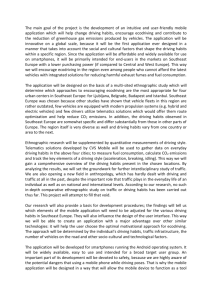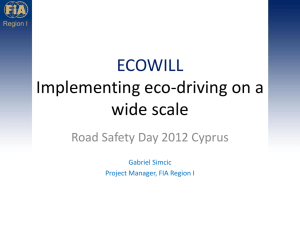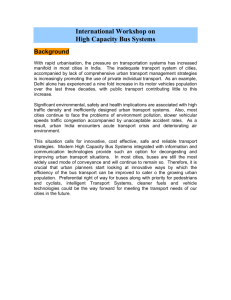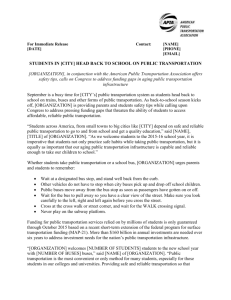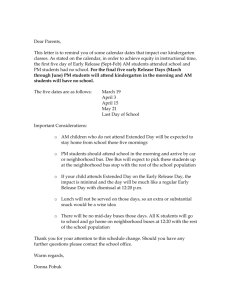Report on EcoDriving Workshop 31 March
advertisement
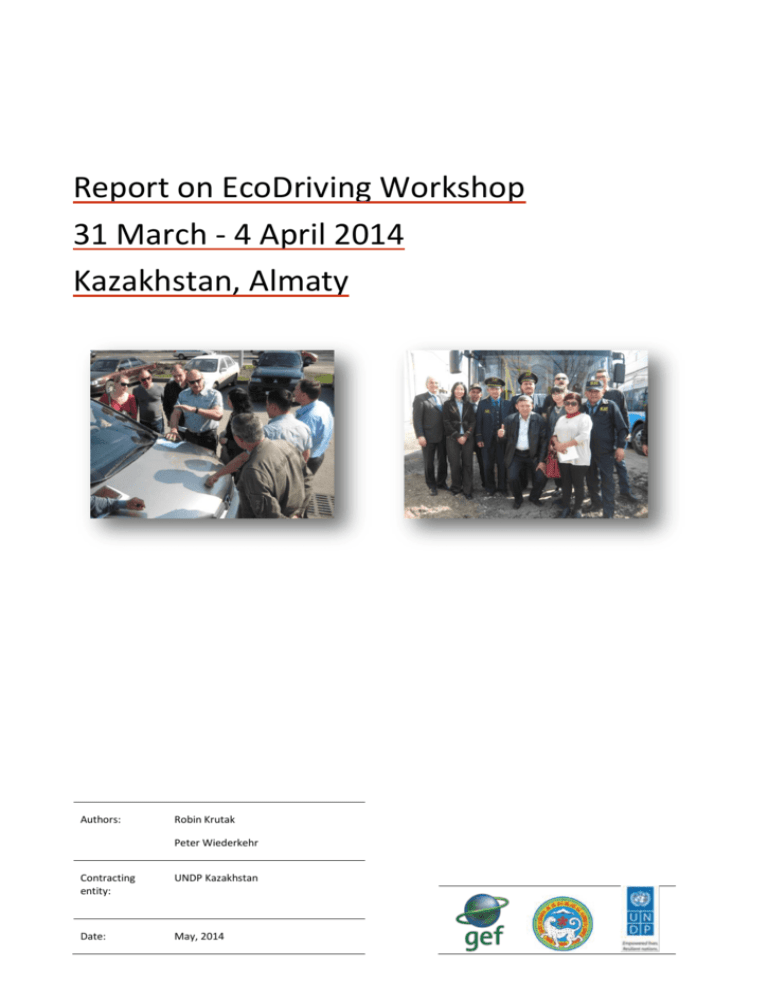
Report on EcoDriving Workshop 31 March - 4 April 2014 Kazakhstan, Almaty Authors: Robin Krutak Peter Wiederkehr Contracting entity: UNDP Kazakhstan Date: May, 2014 IMPRESSUM Published and produced by: Österreichische Energieagentur – Austrian Energy Agency, May 2014 Mariahilfer Straße 136, A-1150 Vienna, Phone +43 (1) 586 15 24, Fax +43 (1) 586 15 24 - 340 E-Mail: office@energyagency.at, Internet: http://www.energyagency.at Editor in Chief: DI Peter Traupmann Project management: Robin Krutak Produced and published in Vienna Reprint allowed in parts and with detailed reference only. Printed on non-chlorine bleached paper. CONTENT 1 2 INTRODUCTION ECODRIVING TRAINING WITH PASSENGER CARS 4 6 2.1 Training format 6 2.2 Adaptation of training materials and documentation 9 2.3 Training results 10 2.4 Conclusions and lessons learned 10 3 ECODRIVING TRAINING WITH BUSES 3.1 Training format 11 3.2 Adaptation of training materials and documentation 13 3.3 Training results 13 3.4 Conclusions and lessons learned 14 4 5 CONCLUDING WORKSHOP ANNEXES 5.1 EcoDriving Workshop Program 17 5.2 List of participants 20 5.3 List of provided training material in Russian language 23 11 15 17 III 1 Introduction EcoDriving, the fuel saving, modern driving style has great potential to improve the health and environmental balance of the transport sector by saving energy and reducing greenhouse gas emissions, reducing health risks from hazardous air pollutants and enhancing traffic safety by a forward looking, relaxed driving style. Some national and international projects on EcoDriving have been carried out during the past decade demonstrating the benefits of fuel efficient driving and reducing CO2 emissions from transport. For instance, the three main projects on EcoDriving at EU level reduced CO2 emissions by more than one million tonnes and promoted the importance of trainings and driver education by identifying and practicing the “Golden Rules of EcoDriving". Results all over Europe show that educated and trained EcoDrivers can easily achieve fuel reductions between 5% to 10% for trucks and buses, even up to 20% for passenger cars, without compromising on comfort or time spent. Successful EcoDriving programs include: (i) a certification scheme for driver trainers, (ii) standardised trainings for novice drivers at driving schools, (iii) cooperation with fleet operators to train company drivers and (iv) competitions for drivers of cars, trucks, buses and agricultural tractors. Austrian klimaaktiv mobil EcoDriving program In 2004, the Mobility Division of the Austrian Federal Ministry of Agriculture, Forestry, Environment and Water Management in cooperation with the Austrian Energy Agency (AEA) and the Federal Branch Association of Driving Schools started to promote EcoDriving in Austria. Results from EcoDriving trainings and practice all over Europe demonstrate that car-, truck- and bus-drivers can easily achieve fuel reductions of 5-15% by applying an energy efficient driving style. A long term evaluation of the Austrian bus carrier proves fuel savings of 6,5% equal to a reduction of diesel consumption of 2 million litres per year! The programme is part of the “klimaaktiv mobil” initiative of the Austrian Federal Government aiming to reduce greenhouse gas emissions in the transport sector. The EcoDriving initiative consists of the following elements: • EcoDriving competitions for drivers: In order to spread the idea of EcoDriving among drivers and also driving schools EcoDriving competitions for passenger car drivers are organised. • EcoDriving certification for driver trainers In seminars more than 1000 trainers for passenger cars, trucks & buses and tractors have been educated and certified to EcoDriving-trainers. The trainers teach according to the content and guidelines of the EcoDriving handbook to ensure the quality standard of klimaaktiv mobil trainings. The average fuel reduction during trainings is up to 15% for heavy-duty vehicles and up to 25% for passenger cars and an average speed increase of 5% is measured due to the forward-looking driving style. • Co-operation with fleet operators Professional drivers in fleets are invited to take part in EcoDriving trainings days. In total about 20.000 drivers participated in an EcoDriving training so far. • EcoDriving trainings for novice drivers Since 2008 novice drivers have to take an EcoDriving lesson at the driving school to complete their driving obligations for the driver licence. 90.000 learner drivers are trained annually. The statistical analysis of the fuel used during these trainings show that fuel consumption was reduced by 14% on average and average speed increased by 5%. THE PEP partnership on EcoDriving Kazakhstan-Austria In 2012 Austria was invited to present the Austrian EcoDriving initiative at the international THE PEP conference in Moscow. As a follow-up EcoDriving was chosen as THE PEP partnership instrument by THE PEP steering committee. In February 2014 the Austrian Energy Agency was chosen by UNDP Kazakhstan to organise and carry-out an EcoDriving training workshop from 31 March to 4 April 2014 in Almaty (Kazakhstan). The Austrian Team for the EcoDriving training workshop included: • Peter Wiederkehr, Transport and Mobility Division, Ministry for Environment • Robin Krutak, Mobility Division, Austrian Energy Agency • Josef Wintersteller, driving instructor and EcoDriving Mastertrainer • Martin Mandlmayr, driving instructor and EcoDriving Mastertrainer • Karl Karner, driving instructor and EcoDriving Mastertrainer The first day was used to check the driving routes and set the final preparations for the EcoDriving trainings. The sites for the trainings with passenger cars and buses were visited and the routes for the practical trainings tested. As a result the training route for passenger cars was adjusted to allow a driving time of 20 minutes. The proposed seminar rooms were found to be very suitable for the theoretical part of the trainings. The second and third day were dedicated to theory and practice of EcoDriving; 17 teachers of local driving schools and drivers of a taxi company participated. The fourth day focussed on EcoDriving for heavy buses. It took place at the facilities of the Almaty Electric Transport – the public bus company in Almaty where 13 bus drivers participated. The last day of the EcoDriving mission was used for a concluding meeting at the town hall of Almaty. Representatives of the City of Almaty, from the Ministry of Transport, the association of driving schools and representatives of the taxi companies were present to learn about the experience with EcoDriving, the results of the trainings in Almaty and discuss possible next steps to set-up an EcoDriving program in Kazakhstan. V 2 EcoDriving training with passenger cars Driving teachers studying in the seminar room Discussing training results with the trainer 2.1 Training format Date: 1-2 April 2014 Category: EcoDriving Training with Passenger Cars Location: Driving School Credo, Almaty The first seminar was carried out for the target group of driving instructors for passenger cars. In total 13 driving instructors from driving schools and four trainers from a taxi company participated. The morning of first training day was used to present and discuss the theory of EcoDriving. After a welcome and introduction by Mrs. Yelena Yerzakovich from UNDP Kazakhstan, Robin Krutak, Austrian Energy Agency introduced the Austrian team and presented the Austrian EcoDriving initiative. The focus of the presentation was on the cooperation with driving schools in Austria, especially the education of driving teachers and the implementation of the legal requirement that every learner driver has to complete a practical EcoDriving training. Further on, the certification scheme for driving schools, the “klimaaktiv mobil driving school”, which is a label for driving schools very active in the field of EcoDriving and climate protection, was presented. In the following session the handbook prepared in Russian language was handed out to the participants. Mr. Wintersteller, one of the master trainers, presented the theory of EcoDriving. The relationship between car driving and the production of greenhouse gas emissions as well as the negative impacts on health by air pollutants was discussed. Most participants were already aware of these correlations, but ideas about effective individual measures to reduce these emissions were little known. Given this situation the trainer explained that especially short distance car trips produce a high amount of emissions and air pollutants, as the cold start emissions are higher as combustion is incomplete and pollution control devices won´t operate effectively at lower temperature. However, these types of trips offer a number of alternatives to car use, as they can easily be substituted by other transport modes, like walking or cycling provided that appropriate and safe infrastructure is available. Another way to influence emissions from car driving significantly is the choice of car being purchased. It is recommended to consider the standardized fuel consumption of the car (type approval figure) when making the buying decision. Another option that reduces the emission per person drastically is carpooling, i.e., the building of groups of persons going together in a car instead of one person per car. In the following session the EcoDriving Rules for maintaining the vehicle were presented, mainly: Checking tyre pressures frequently, as lower tyre pressure increases fuel use. Avoiding dead weight and aerodynamic drag by removing the roof racks not used that produce a lot of air resistance and add dead weight Checking the car regularly and have it serviced to keep it "eco-fit” to reduce friction and power losses of the propulsion system The next issues were the presentation on how to use the technical equipment and features of the car, with the focus on the following topics: Appropriate use of the air conditioning and electrical equipment Closing of windows when driving at higher speeds to avoid drag and air resistance Rolling of the car with gear locked-in to induce braking action by the engine without using the brakes Driving with automatic transmission to save fuel Driving with cruise control to save fuel Use the fuel consumption device as a feed-back information tool Finally, theory of EcoDriving on the first training day was completed by a discussion of the EcoDriving Rules when driving a car: Drive-off immediately after starting the engine; do not warm up the engine by idling Switch-off the engine during longer stops Anticipate traffic flow to avoid unnecessary accelerations Use momentum of the car in motion Shift up gears early Maintain a steady speed at low RPM The theory was illustrated by short film sequences of the Austrian EcoDriving film, which was provided in Russian language. Participants gave the feedback that the film sequences were very helpful and were liked very much. Yet, there was scepticism by participants, whether EcoDriving could work in congested traffic or even in traffic jam situations, which occurs very often in the City of Almaty. There were lively discussions between the trainers and the participants about this issue. In the afternoon, the first part of the practical training took place. The challenge was to apply in real traffic situations what was theoretically presented and learned from the EcoDriving rules. Five cars were used, each occupied by a team VII of 3-4 persons. Each team was driving the training route in real traffic several times. The time to drive the route once took about 20 minutes. The driver changed after each route so that all team members had the chance to practice. Three out of the five cars were accompanied by an EcoDriving trainer. To practice the EcoDriving rules with the participant the trainers applied the coaching method: The participant is driving with advice and instructions from the trainer. The trainer discusses the way of driving with each driver and gives feedback on how to improve the driving style. Also the teams without a trainer had the task to also practice the coaching method. The participants not actively driving were coaching the driver and tried to draw his attention to make use of the EcoDriving rules even better. The teams also changed between the cars, so that every participant got the chance to drive with an EcoDriving trainer. The second training day started with a feedback round from the participants. A special surprise for the trainer team was, when two participants reported that they had been walking to the venue in the morning for the first time – and enjoyed it very much! The feedback from the participants showed that the scepticism from the first day, especially concerning the issue of whether EcoDriving were possible in heavy traffic situations, was gone. Then, the motivation aspects of EcoDriving, which can be very diverse, were presented. A number of different aspects can be used to motivate drivers to join an EcoDriving training: reduce costs avoid emissions reduce noise increase traffic safety feel better and enhance comfort while driving Finally, the technical equipment to reduce air pollutant emissions like particle filters and catalytic converters were presented followed by a discussion about the advantages of alternative fuels and vehicles, especially methane gas and electric engines. In the afternoon again the practical training took place. It was organised the same way as the day before to improve the skills of EcoDriving. After an intense and successful two-day training in theory and practice of EcoDriving all 17 participants received a “Confirmation of Participation” from Yelena Yerzakovich and Peter Wiederkehr. 2.2 Adaptation of training materials and documentation The following training materials have been prepared for this training in Russian language: Powerpoint presentation about EcoDriving with passenger cars, 60 slides Handbook on EcoDriving passenger cars, 49 pages with Film sequences on EcoDriving, about 20 minutes Specific questions that were raised by the participants during the training were: • Is it possible to drive eco-friendly also in congested traffic situations? • Is it possible to practice EcoDriving with a car using automatic transmission? • How much money for fuel and maintenance can be saved with EcoDriving per year (in Tenge)? The training materials for passenger cars need to be adapted and tailored to the local conditions. The following issues should be addressed: • transport emissions including those from passenger cars and trucks & buses in Kazakhstan and Almaty • cost savings through EcoDriving by using local prices for petrol, service-, maintenance- and repair costs • how to cope with parked cars at the second lane when driving • market overview on monitoring devices of fuel consumption for passenger cars • market overview on alternative vehicles available in Kazakhstan (especially hybrid, plug-in hybrid and electric vehicles as well as CNG vehicles) • use photo material, graphs and illustrations from Kazakhstan (instead of Austria) wherever possible IX 2.3 Training results There was one short fall of the trainings: it was difficult to collect the data about the reduction in fuel consumption, as not all cars were equipped with an appropriate fuel consumption monitoring device. It was possible to collect the data from the following cars: Table 1: Fuel Consumption during the EcoDriving training FUEL CONSUMPTION IN L/100KM DAEWOO PERCENTAGE FUEL REDUCTION HONDA CRV PERCENTAGE FUEL REDUCTION SUBARU OUTBACK Default Value* 11,4 13,92 n.a. Driver 1 8,2 -28% 12,45 -11% 13,92 Driver 2 8,2 -28% 12,78 -8% 14,25 Driver 3 8 -30% 13,44 -3% Driver 4 10,2 -11% 13,3 -4% Driver 5 9,8 -14% 13,3 -4% Average 8,9 -22% 13,05 -6% 14,09 *…The default value was the figure shown by the fuel consumption device before the beginning of the training on the board computer of the specific car. It is used to compare the fuel consumption during the training with the value that was reached before the training. The data show that the fuel consumption during the training was significantly lower than the default value of the monitoring device before the training, on average -22% fuel consumption with the DAEWOO and -6% with the Honda CRV. The magnitude (average from - 6% up to -22%) and the range of individual fuel reductions (-3% up to -30%) is comparable to the figures from trainings in Austria. 2.4 Conclusions and lessons learned The following conclusions were drawn from this training for the category of passenger cars: • the EcoDriving concept (combination of psychological teaching methods, communication, techniques and practices) worked also for the traffic conditions of cars in the Almaty metropolitan area • EcoDriving for cars in highly congested traffic situations requires specific know-how and skills to cope with it in order to benefit from EcoDriving • the personal advantages of EcoDriving have been recognised and understood – EcoDriving enables a more relaxed and personally satisfying driving style – EcoDriving is perceived as a modern, environmentally friendly and safe driving style – EcoDriving increases overall transport efficiency and saves energy, resources and costs • fuel consumption monitoring devices are of critical importance for the success of EcoDriving as they provide the necessary real-time feed-back information to the driver 3 EcoDriving training with buses Participants in the seminar room during the theoretical instruction Advice by the trainers in the bus 3.1 Training format Date: 3 April 2014 Category: EcoDriving Training with Buses Location: Almaty Electric Transport Bus Company The second seminar was conducted for a group of 13 bus drivers from the Almaty Electric Transport Bus Company. After a welcome and introduction by Mrs. Yelena Yerzakovich from UNDP Kazakhstan, Mr. Peter Wiederkehr introduced the Austrian team and the policy context of the EcoDriving program in Austria, its goal, objectives and achievements as well as the challenge of this EcoDriving pilot training in Almaty. In the morning, the theory of EcoDriving was presented to the bus drivers by Mr. Wintersteller. The potential of EcoDriving for reducing fuel consumption and air pollutant emissions was presented using the example of the national postal bus company in Austria: In a pilot project all bus drivers from the Austrian national bus carrier were trained and a long term reduction in fuel consumption of 6,5% was reached. At the end of the presentation the EcoDriving handbook for buses prepared in Russian language was given to the participants. It was pointed out especially for the attending target group of bus drivers that first of all the new driving style reduces the stress level for the driver. As for heavy-duty vehicle fleet operators the cost argument is particularly relevant, a lot of room was given to discuss this topic. In the following the theory of EcoDriving with buses was presented, with the focus on the following topics: Correlation of speed (particularly engine speed in rpm) and fuel consumption Resistance factors for driving: o rolling resistance (weight and tyre pressure) o aerodynamic resistance (vehicle size and body shape) XI o resistance to acceleration (heavy vehicle weight) o climbing resistance (slope of road) How to use the bus engine in a fuel efficient way Again participants were quite sceptic about the issue whether EcoDriving could work in heavy traffic or congested situations. To prove the feasibility, a practical training was conducted in the afternoon. Three buses from the bus company were used. In each bus 4 participants and an EcoDriving trainer formed a team. Each participant had the opportunity to drive the bus for about 20 minutes while being coached by the EcoDriving trainer. After all participants had completed this training part a new task was presented: each bus driver had to coach another colleague bus driver. The Austrian trainers were surprised by the high level of coaching ability showed by the participants. After the practical training the group again gathered in the seminar room. A final exchange of views was organised and it became obvious that the bus drivers recognised that EcoDriving works also possible in heavy traffic situations. The training session was finished with a complement from a participant asking the trainers when they would come back again. All 13 bus drivers participated successfully in the one-day training in theory and practice and received the “Confirmation of Participation” from Yelena Yerzakovich and Peter Wiederkehr. 3.2 Adaptation of training materials and documentation The following training materials have been prepared for this training in Russian language: Powerpoint presentation about EcoDriving with buses, 70 slides Handbook on EcoDriving with buses, 49 pages Film sequences on EcoDriving, about 20 minutes The training materials for buses need to be adapted and tailored to the local conditions. The following issues should be addressed: • provision of user manuals for the specific bus models • cost savings through EcoDriving by using local prices for petrol, service-, maintenance- and repair costs • market overview on monitoring devices of fuel consumption for buses • market overview on alternative buses available in Kazakhstan (especially hybrid, plug-in hybrid and electric vehicles as well as CNG vehicles) • photo material and graphs from Kazakhstan (not from Austria) wherever possible • calculation of emissions from transport in general and from passenger cars and trucks & buses in Kazakhstan and Almaty • typical situation in Almaty of approaching a bus stop 3.3 Training results Unfortunately the buses were not equipped with a specific fuel monitoring device. There was only an instrument showing the level of gas in the fuel tank which wasn’t appropriate to measure the fuel consumption of a short training route. Therefore, it was difficult to assess and evaluate the results and demonstrate the improvements. XIII 3.4 Conclusions and lessons learned During the preparation of the training day it turned out that no user manuals for the buses were available. It also turned out that drivers were not fully informed about all the technical devices in the cockpit. Thus, a manual for the drivers explaining the devices in the cockpit should be prepared and made available. Specific questions that were raised by the participants during the training were: • Is it possible to drive more relaxed also in congested traffic situations? • Will EcoDriving really provide a benefit for the passengers, as they may enjoy a smoother way of driving with less braking and acceleration? The following conclusions were drawn from this training for the category of buses: • the EcoDriving concept for bus drivers (combination of psychological methods, communication techniques and practices) also works for the traffic conditions in the Almaty metropolitan area • provision of technical information about vehicles is essential, as the drivers are not familiar with all functions of the control panel in the cockpit. • EcoDriving for buses in highly congested traffic situations requires specific know-how and skills to cope with • approaching and leaving the bus stop needs to be trained as this situation offers a big potential for fuel saving • fuel consumption monitoring devices are a crucial feed-back tool for the drivers • the training situation of coaching a colleague did not work when the coach was very young and the driver an experienced employee. • fuel consumption monitoring devices are a crucial feed-back tool for the drivers 4 Concluding Workshop Some of the participants of the workshop Robin Krutak and Peter Wiederkehr from the Austrian Delegation Date: 4 April 2014 Location: Almaty City Hall After having completed the training seminars, a meeting was organized by UNDP Almaty office in the Almaty City Hall. About 20 relevant stakeholders from different areas such as Municipality of Almaty, Kazakhstan Ministry for Transport, UNDP Kazakhstan, Almaty Driving School Association and fleet owners participated. The workshop was hosted and chaired by the Vice-Mayor of Almaty. The discussions and exchange of experience revealed that a twofold approach will be needed to implement a national EcoDriving program in Kazakhstan: • A Framework for the program should be developed: An institution or body has to be established that is in the lead for such a program and acts as a platform for other stakeholders who are willing to support the program. This organisation would also be the authorized body to certify EcoDriving trainers. • Task force with national experts on EcoDriving: A task force should be established to develop and propose a training program especially for the needs of drivers in Kazakhstan and especially Almaty. It was suggested that this task force could be supported by the EcoDriving experts from Austria. On the basis of the experience gained at the workshop the following conclusions were drawn by the Austrian team and possible next steps proposed: • setting-up of an EcoDriving task force with experts in Almaty/Kazakhstan • establish a process for developing and promoting a common understanding of the EcoDriving rules • develop a certification scheme with qualification criteria for trainers XV • establish partnerships with other organizations • monitor the results of the EcoDriving trainings - right from the very beginning • implement sound practical driving trainings under real driving conditions to supplement guidelines and EcoDriving tips with good practice! The Austrian experts would like to thank UNDP Kazakhstan and Ms. Yelena Yerzakovich and her team for the generous hospitality and support to make this premiere a success and very much appreciated the opportunity to present and carry out the EcoDriving workshops for professional drivers in Almaty. The experts will be pleased to provide support for further EcoDriving initiatives and continue the promising cooperation on EcoDriving between Kazakhstan and Austria! 5 Annexes 5.1 EcoDriving Workshop Program Time Program Resources/Vehicles st Day 1: Monday, 31 of March 2014 Pre-Workshop: technical preparation, equipment and route definition 10:00 – 12:00 Checking of site for EcoDriving Workshop and definition of training route for passenger cars, in particular checking fuel consumption devices by the organisers - 2 cars that will be used for the training - 2 local drivers to define the training route CAST project team; AEA/Instructors Team Austria; representative from local driving schools 12:00 Lunch Break 14:00-16:00 Checking of site for EcoDriving Workshop and definition of training route for busses, in particular checking fuel consumption devices - 1 bus that will be used for the training - 1 local driver to define the training route by the organisers CAST project team; AEA/Instructors Team Austria; representative from bus company st Day 2: Tuesday, 1 of April 2014 EcoDriving Workshop, category: passenger cars (1) Workshop type: - Two day pilot workshop for instructors from driving schools and taxi instructors. - Number of participants: 12-15 Objective: Theory and practical training will enable participants to teach EcoDriving to learner drivers of passenger cars and taxi drivers. 9:00-9:30 Welcome and introduction: Motivation for EcoDriving for cars 9:30-12:30 CAST project manager Almaty Welcome by BMLFUW/AEA: introduction and context Representative from local driving schools: Theory on EcoDriving Part 1 1 interpreter (German-Russian) 1 interpreter (German-Russian) Presentation of theoretical background by XVII BMLFUW/AEA representatives 12:30-13:30 Lunch Break 13:30-16:30 Practical Training Part 1 3 interpreters (German-Russian) EcoDriving Instructors for 6 passenger cars with fuel consumption devices 3 EcoDriving instructors Group discussion on training results and experiences 1 interpreter (German-Russian) 16:30-17:00 Evaluation of Theory and Practice by BMLFUW and AEA representatives nd Day 3: Wednesday, 2 of April 2014 EcoDriving Workshop, category: passenger cars (2) st 9:00-12:00 Review of 1 day and Theory on EcoDriving Part 2 1 interpreter (German-Russian) Presentation of theoretical background by BMLFUW/AEA representatives 12:00-13:00 Lunch Break 13:00-16:00 Practical Training Part 2 by EcoDriving Instructors for 6 cars with fuel use devices 3 EcoDriving instructors 3 interpreters (German-Russian) Tests on EcoDriving Theory 16:00-17:00 Discussion of results on Theory and Practice 2 interpreters (German-Russian) Instructors, BMLFUW/AEA representatives 17:00 Hand out of Certificates of Participation on EcoDriving for Passenger Cars, BMLFUW and AEA representatives rd Day 4: Thursday, 3 of April 2014 EcoDriving Workshop, category: buses Workshop type: - pilot workshop for key personnel and driver trainers from Almaty public bus company. - Number of participants: 12-15 Objective: Theory and practical trainings will enable participants to teach basic principles of EcoDriving with buses and what is needed to set up a sustainable EcoDriving initiative in the company. 9:00-9:30 Welcome and introduction: Motivation for EcoDriving for buses CAST project manager Almaty Context by BMLFUW/AEA Representative from Almaty bus company 1 interpreters (German-Russian) 9:30-12:30 Theory on EcoDriving Presentation of theoretical background by BMLFUW/AEA representatives 12:30-13:30 Lunch Break 13:30-16:30 Practical Training and fuel monitoring 1 interpreters (German-Russian) 3 interpreter (German-Russian) Mastertrainer Instructors for 3 buses with fuel consumption devices 16:30-17:00 Discussion on Results and lessons learned: 1 interpreter (German-Russian) Evaluation by BMLFUW/AEA 17:00 Hand out of Certificates of Participation on EcoDriving for Buses, BMLFUW and AEA representatives XIX 5.2 List of participants 1-2 April 2014, training with passenger cars № Name Title, organization 1. 2. 3. Yelena Yerzakovich Almara Kalipanova Batima Mazuyeshova Peter Wiederkehr CAST project manager CAST project logistics assistant Interpreter 4. 5. 6. 7. 8. 9. 10. 11. 12. 13. 14. 15. 16. Robin Krutak Karl Karner Josef Wintersteller Martin Mandlmayr Toleubekov Galymzhan Amirov Zamir Alimbetov Erik Tursunbayev Abdurakhman Mamedov Dilavar Gulyayeva Olga Babichev Valentin Umnushkin Pavel 17. Krutikhin Vadim 18. Vankov Valeriy 19. Dityatev Mikhail 20. Ivancova Irina 21. Zotov Alexandr 22. Golev Igor 23. Suleimanov Imiral 24. Mamazhanov Bekzhan 25. Kharlamov Alexandr № driving experience license, Federal Ministry of Agriculture, Forestry, Environment and Water Management Austrian Energy Agency Master trainer Master trainer Master trainer Instructor, “Komandir” eco-taxi HZ №000240, 10 years Instructor, “Komandir” eco-taxi Instructor, “Komandir” eco-taxi Instructor, “Komandir” eco-taxi ВК № 024567, 12 years АА №174062, 9 years HZ №023109, 7 years Instructor, driving school «SDS» Instructor, driving school «SDS» Instructor, driving school «Automerial» Instructor, driving school «Maya and Co» Instructor, driving school « Maya and Co » Instructor, driving school «Credo» Instructor, driving school « Maya and Co » Instructor, driving school «Amur Autoprofi» Instructor, driving school «Amur Autoprofi» Instructor, driving school «Amur Autoprofi» Instructor, driving school «SDS» Instructor, driving school «Gulzira» AZ010640, 23 years AG016077, 9 years AA176524, 21 years BH027598, 20 years Instructor, driving school «Credo» AZ151515, 22 years AZ049633, 20 years AZ009483, 39 years AU008156, 20 years AZ048210, 15 years PZ000205 AA186773, 20 years XX144794, 22 years AZ136986, 10 years 3 April 2014, training with buses: 1. Yelena Yerzakovich CAST project manager 2. Almara Kalipanova CAST project logistics assistant 3. Batima Mazuyeshova Interpreter 4. Peter Wiederkehr Federal Ministry of Agriculture, Forestry, Environment and Water Management 5. Robin Krutak Austrian Energy Agency 6. Karl Karner Master trainer 7. Josef Wintersteller Master trainer 8. Martin Mandlmayr Master trainer 9. Taldybayev Altynbek Head of training center for drivers of trams, trolleybuses and buses, Municipal bus park (depot) 10. Ensebayeva Zhazira Head of operations department, Municipal bus park (depot) 11. Kaldybekov Mukan Instructor, Municipal bus park (depot) 12. Turatov Bakhtiyar Driver, Municipal bus park (depot) 13. Mustafayev Mukhtar Driver, Municipal bus park (depot) 14. Tleutayev Zhumagali Driver, Municipal bus park (depot) 15. Nurmambekov Hamiddula Driver, Municipal bus park (depot) 16. Ashimbekov Zhunus Driver, Municipal bus park (depot) 17. Murynov Ruslan Instructor, Municipal bus park (depot) 18. Meshitbayev Erkin Driver, Municipal bus park (depot) 19. Baitasov Alikhan Driver, Municipal bus park (depot) 20. Shymshykov Kayrat Driver, Municipal bus park (depot) 21. Kozhakanov Kaysar Driver, Municipal bus park (depot) 22. Tonkay Ermek Driver, Municipal bus park (depot) 23. Koishimbekov Talgat Driver, Municipal bus park (depot) XXI 4 April 2014, workshop: 1. Yelena Yerzakovich CAST Project Manager 2. Almara Kalipanova CAST Project Logistics Assistant 3. Alexandra Mazurina Interpreter 4. Peter Wiederkehr Federal Ministry of Agriculture, Forestry, Environment and Water Management 5. Robin Krutak Austrian Energy Agency 6. Karl Karner Master trainer 7. Josef Wintersteller Master trainer 8. Martin Mandlmayr Master trainer 9. Yuriy Ilyin Deputy Mayor of Almaty city 10. Moldabek Abdenov Expert of Road Transport Department, Ministry of Transport and Communications of RK 11. Yerlan Adilov Deputy Head of Public Transport Department 12. Makhmud Zhagabayev Deputy Head of Traffic Police Department 13. Batima Isina Advisor Centre) 14. Yerlan Shurenov Head of department of PSC 15. Oleg Ivanov Deputy General Director, Almatyelectrotrans 16. Taldybayev Altynbek Head of training center for drivers of trams, trolleybuses and buses, Municipal bus park (depot) 17. Maya Kan Chairman, Association of driving schools of Almaty city 18. Valeriy Berezhnov Engineer, Taxi park №1 19. Bekezhan Tynyshtykbay Director, LLP “Madina” 20. Yersyn Kobdikbayev Director, LLP “Kiykbay” 21. Sultan Nazarov LLP “Auto Alma-Trans” 22. Alexandr Kulakov LLP “Trans-service” 23. Dilmurat Nizamov Director, LLP “Sant” 24. Beibut Aliyev LLP “Olzhas Ltd” 25. Mustafa Gagiyev Director, LLP “Autopark №4” 26. Oraz Sabdenov Director, LLP “Samat Trans” 27. Galym Kusainov Deputy Director, LLP “Duman trans” 28. Serik Zhumabayev LLP “Talap T” 29. Ramazan Iskakov LLP “Trans AB” 30. Baurzhan Tulbasov Director, LLP “Batu Travel company” 31. P. Mamilov KazATO 32. Murat Amirov Association of driving schools 33. Maxim Sarsenov “Komandir taxi” company 34. Galina Glupsheva “Credo” driving school 35. Nailya Mustayeva Program Manager, CAREC 36. Zauresh Aitenova Austrian Embassy Commercial Section M to General Director of PSC (Public Service 5.3 List of provided training material in Russian language DVD with film sequences about EcoDriving, about 20 minutes Handbook on EcoDriving with passenger cars, 49 pages XXIII Powerpoint presentation about EcoDriving with passenger cars, 60 slides Handbook on EcoDriving with buses, 49 pages Powerpoint presentation about EcoDriving with buses, 70 slides XXV www.energyagency.at
